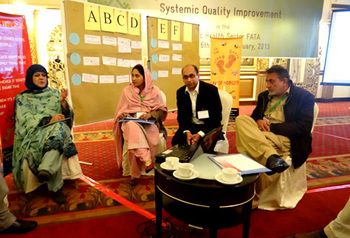Strengthening the health system
Project description
Title: FATA Development Programme – result area: Strengthening the health system
Commissioned by: German Federal Ministry for Economic Cooperation and Development (BMZ)
Country: Pakistan
Lead executing agency: FATA Secretariat
Overall term: 2009 to 2015

Context
Pakistan's Federally Administered Tribal Areas (FATA) lie on the country's border with Afghanistan. This region is characterised by great need and a whole host of overlapping and often violent conflicts. In the FATA, there are no state structures at municipal level. The population is only involved in decision-making through their traditional tribal representatives. However, the last few years have seen these representatives lose much of their backing from the population or fall victim to targeted attacks by militants. The state is very limited in its ability to provide basic social services. The marginalisation of large swathes of the population, a dearth of opportunities for participation in decision-making processes, and a lack of access to basic services and income-generating activities have all engendered a deep sense of government distrust among the population. The associated sense of powerlessness and deep frustration serves as a breeding ground for extremism. The FATA region is very difficult for outsiders to access, with most of the population cut off from the progress being made within Pakistan generally.
Objective
The foundations have been laid for better, demand-oriented services in the health sector of Pakistan's FATA region.
Approach
Together with the FATA Secretariat's Directorate of Health and the Health Sector Reform Unit, the latter established in 2009, the quality of health services has been identified as key issue. The quality of state health services provided by public health facilities in the FATA region is being improved using a range of measures, including the establishment of minimum standards, training for technical staff, involvement of local communities in quality teams, and the introduction of new management approaches for quality assurance. Further developing the Health Management Information System is also to help enhance the quality of medical care in the region.
Results
A quality improvement initiative, drawn up jointly by the staff of public health institutions and civil society representatives, was adopted in 2011. The quality standards laid out in this initiative have been applied to all 915 health facilities in FATA since 2013.Building on these standards, 50 specially trained quality managers have drawn up improvement plans for 36 health facilities.
The changes at these facilities are being evaluated by journalists from the Independent Project Reporting (IPR) project. To this end, a module on health services has been integrated into the Development Journalism course at the University of Peshawar. Guidelines to interview patients and employees have also been developed and tested.
A strategy for improving the quality and use of the district Health Management Information System has been developed in cooperation with the Secretariat, and a concept on using m-health tools for generating data is currently being drafted. Staff from the Directorate of Health took part in a national study trip and attended two conferences in order to engage in dialogue with professionals from other provinces of Pakistan that are already successfully using these tools in their provision of medical care.
The project worked with local training institutions to instruct 146 staff from local health facilities in neonatal and childhood illness management, emergency obstetric, new-born care, infection prevention and emergency management. The course curricula and training materials had been developed beforehand in cooperation with representatives from the health facilities and the Directorate of Health.